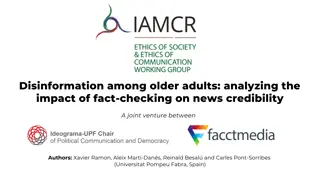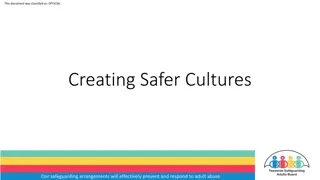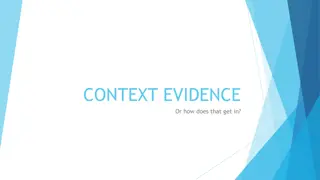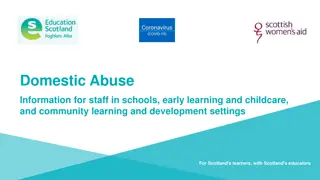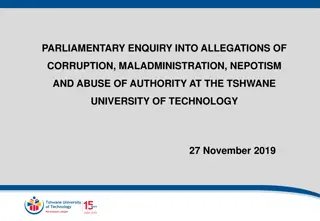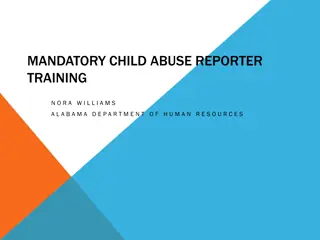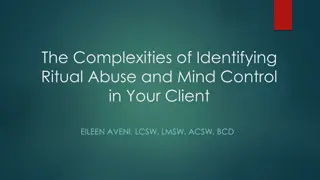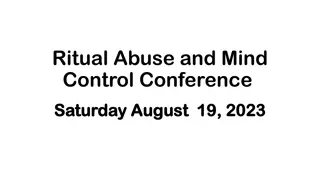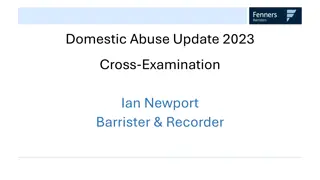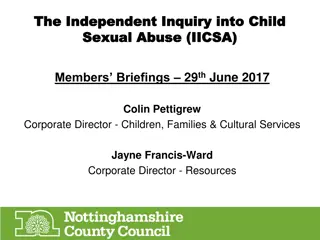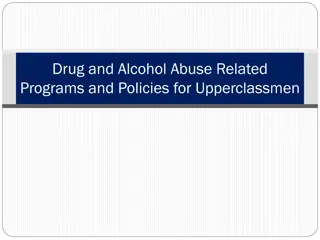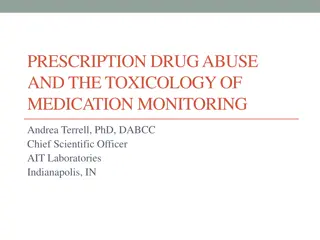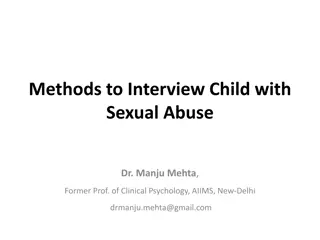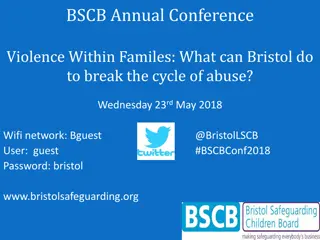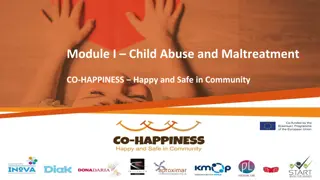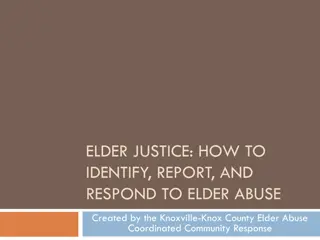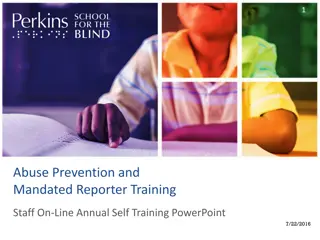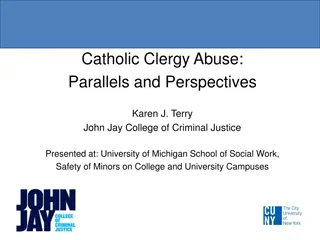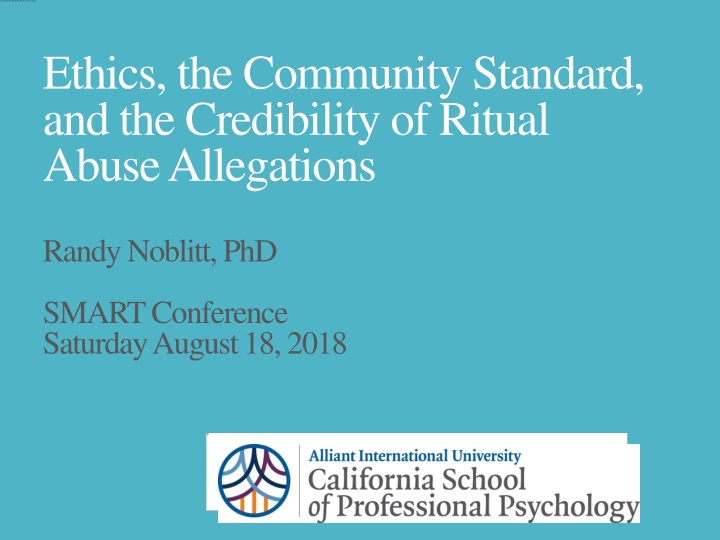
Mental Health Professionals' Beliefs on Ritual Abuse Survivors
Explore the credibility of ritual abuse allegations among mental health professionals, discussing research findings, community standards, and ethical considerations. Learn about defining ritual abuse, interpreting allegations, and practical applications for advocacy and ethical practice.
Download Presentation

Please find below an Image/Link to download the presentation.
The content on the website is provided AS IS for your information and personal use only. It may not be sold, licensed, or shared on other websites without obtaining consent from the author. If you encounter any issues during the download, it is possible that the publisher has removed the file from their server.
You are allowed to download the files provided on this website for personal or commercial use, subject to the condition that they are used lawfully. All files are the property of their respective owners.
The content on the website is provided AS IS for your information and personal use only. It may not be sold, licensed, or shared on other websites without obtaining consent from the author.
E N D
Presentation Transcript
Ethics, the Community Standard, and the Credibility of Ritual Abuse Allegations Randy Noblitt, PhD SMART Conference Saturday August 18, 2018
To what extent do mental health professionals believe ritual abuse (RA) survivors? This presentation comprehensively reviews the empirical studies about the degree of credibility that MH professionals have about RA allegations. After presenting the findings there will be a discussion that welcomes the opinions of the attendees regarding their own conclusions including considerations of the community standard, professional ethics, related forensic questions, and advocacy for extreme abuse survivors.
Learning objectives Learning objectives Participants will be able to Participants will be able to Cite examples of research on the credibility of ritual Cite examples of research on the credibility of ritual abuse allegations abuse allegations Formulate their own informed opinions about this Formulate their own informed opinions about this research research Consider how this research may apply to the Consider how this research may apply to the community standard for clinical practitioners community standard for clinical practitioners Discuss how this research may be applicable Discuss how this research may be applicable regarding forensic mental health concerns regarding forensic mental health concerns Apply the research findings to practical advocacy and Apply the research findings to practical advocacy and ethical practice, enabling clinicians to provide better ethical practice, enabling clinicians to provide better psychological care to the consumer psychological care to the consumer
Introduction: Introduction: What is ritual abuse? What is ritual abuse? Defining ritual abuse Defining ritual abuse RA vs. SRA RA vs. SRA RA vs. mind control RA vs. mind control Extreme abuse Extreme abuse
Introduction: Introduction: What is ritual abuse? What is ritual abuse? Interpreting RA allegations Interpreting RA allegations Accuracy of abuse interpretation Accuracy of abuse interpretation Socio Socio- -cognitive theory (Spanos, 1994) cognitive theory (Spanos, 1994)
The professional literature The professional literature The professional literature is polarized with The professional literature is polarized with regard to the two theories. regard to the two theories. Much of the literature reflects stated opinions Much of the literature reflects stated opinions without supporting or contradictory empirical without supporting or contradictory empirical research cited. research cited. Other literature reflects research selectively. Other literature reflects research selectively.
The The professional literature professional literature Comprehensive empirical literature reviews may Comprehensive empirical literature reviews may reduce bias. reduce bias. There are three comprehensive empirical There are three comprehensive empirical literature reviews on RA to date. literature reviews on RA to date.
Comprehensive empirical Comprehensive empirical research reviews on RA research reviews on RA o Kathleen Faller s article Ritual Abuse: A Kathleen Faller s article Ritual Abuse: A Review of the Research (1994) Review of the Research (1994) o Noblitt & Noblitt & Perskin Perskin (2000) (2000) o Noblitt & Noblitt (2014) Noblitt & Noblitt (2014)
Overview of ethical clinical practice Overview of ethical clinical practice There are a variety of mental health professions There are a variety of mental health professions including: including: o Counselors Counselors o Marriage and family therapists Marriage and family therapists o Nurses Nurses o Psychiatrists Psychiatrists o Psychologists Psychologists o Social workers Social workers
Overview of ethical clinical practice Overview of ethical clinical practice Each profession establishes its own ethics code (see Fisher, 2018) although the codes are similar to one another.
Overview of ethical clinical practice Overview of ethical clinical practice For example, the American Psychological For example, the American Psychological Association s (2018) Association s (2018) Ethical Principles of Ethical Principles of Psychologists and Code of Conduct Psychologists and Code of Conduct lists aspirational general principles and enforceable aspirational general principles and enforceable ethical standards. ethical standards. lists
Overview of ethical clinical practice: Overview of ethical clinical practice: General principles (APA, 2018) General principles (APA, 2018) oBeneficence and Nonmaleficence Beneficence and Nonmaleficence o Fidelity and Responsibility Fidelity and Responsibility o Integrity Integrity o Justice Justice o Respect for People's Rights and Dignit Respect for People's Rights and Dignity y
Overview of ethical clinical practice: Overview of ethical clinical practice: Ethical standards (APA, 2018) Ethical standards (APA, 2018) o Resolving Ethical Issues o Competence o Human Relations o Privacy and Confidentiality o Advertising and Other Public Statements o Record Keeping and Fees o Education and Training o Research and Publication o Assessment o Therapy
An additional ethics consideration: The community standard What would a reasonable mental health professional do when encountering clients with reports of having experienced ritual abuse? Seek education, consultation, etc. ?
Introduction to the problem of Introduction to the problem of credibility, and its relevance to ethical credibility, and its relevance to ethical clinical practice clinical practice Why is the question of credibility important? Why is the question of credibility important?
Introduction to the problem of Introduction to the problem of credibility, and its relevance to ethical credibility, and its relevance to ethical clinical practice clinical practice Why is the question of credibility important? Why is the question of credibility important? How do abuse survivors feel when they How do abuse survivors feel when they encounter skeptical reactions to their abuse encounter skeptical reactions to their abuse narratives? narratives?
Introduction to the problem of Introduction to the problem of credibility, and its relevance to ethical credibility, and its relevance to ethical clinical practice clinical practice Why is the question of credibility important? Why is the question of credibility important? How do abuse survivors feel when they How do abuse survivors feel when they encounter skeptical reactions to their abuse encounter skeptical reactions to their abuse narratives? narratives? Palo and Gilbert (2015) studied this Gilbert (2015) studied this phenomenon and found that sexual abuse phenomenon and found that sexual abuse survivors who experienced more unhelpful and survivors who experienced more unhelpful and fewer supportive responses to their abuse fewer supportive responses to their abuse disclosures also evidenced more PTSD as well as disclosures also evidenced more PTSD as well as worse PTSD symptoms. worse PTSD symptoms.
Introduction to the problem of Introduction to the problem of credibility, and its relevance to ethical credibility, and its relevance to ethical clinical practice clinical practice Do Do clinicians have a duty to be generally clinicians have a duty to be generally supportive of their clients? supportive of their clients? When therapists are unsupportive, might such When therapists are unsupportive, might such treatment worsen the traumatic effects of their treatment worsen the traumatic effects of their clients past abuses? clients past abuses?
Method Goal: To develop a comprehensive review of Goal: To develop a comprehensive review of empirical research on the topic of the empirical research on the topic of the believability of RA allegations to therapists believability of RA allegations to therapists
Method oProcedure: Procedure: oReviewed all relevant studies cited in the most Reviewed all relevant studies cited in the most recent comprehensive review (Noblitt & Noblitt, recent comprehensive review (Noblitt & Noblitt, 2014) 2014) o Used the PsycINFO search engine to look for Used the PsycINFO search engine to look for any additional empirical studies, but found any additional empirical studies, but found none. none.
Seven studies were identified and Seven studies were identified and reviewed (listed chronologically) reviewed (listed chronologically) o Perry (1992) o Goodman, Qin, Bottoms, & Shaver (1994); and Bottoms, Shaver & Goodman (1996) o Andrews, Morton, Bekerian, Brewin, Davies & Mollon, (1995) o Schmuttermaier & Veno (1999) o Norcross, Koocher & Garofalo (2006) o Becker, Karriker, Overkamp, & Rutz (2008). Rutz, Becker, Karriker & Overkamp (2008); and Becker, Karriker, Rutz & Overkamp (2013) o Ost, Wright, Easton, Hope & French (2013)
Perry (1992) In a survey of members of the International Society for the Study of Multiple Personality and Dissociation, Perry (1992) found that 88% of 1185 respondents reported belief in ritual abuse, involving mind control and programming (p. 4). Strengths: a survey of qualified professionals Weaknesses: possible biases of respondents
Goodman, Qin, Bottoms, & Shaver (1994); and Bottoms, Shaver & Goodman (1996) These researchers conducted 5 studies that were summarized in Goodman, Qin, Bottoms, & Shaver (1994);. Only the first of the studies addressed the question of perceived credibility.
Goodman, Qin, Bottoms, & Shaver (1994); and Bottoms, Shaver & Goodman (1996) In a national survey of 2,709 clinical psychologists who were members of the American Psychological Association, the authors investigated the frequency of RA allegations made to psychologists. This study showed that within their sample of psychologists,70% denied 70% denied and 30% acknowledged seeing at least one case of ritualistic or religion-related abuse since January 1, 1980 (Bottoms, Shaver, & Goodman, 1991, p. 6). (Cited in Noblitt & Noblitt, 2014, pp. 53 54)
Goodman, Qin, Bottoms, & Shaver (1994); and Bottoms, Shaver & Goodman (1996) Strengths: Large samples, well designed, multidisciplinary clinicians Weaknesses: Bias evident in failure to cite authors with alternate data or perspectives, interpreting their outcomes critically of RA credibility when they could be interpreted as supportive, and their stating: Most clients who allege ritual abuse are diagnosed as having multiple personality disorder or post-traumatic stress disorder, two increasingly popular, but controversial psychological diagnoses (Bottoms, Shaver & Goodman, 1996, p. 1)
Andrews, Morton, Bekerian, Brewin, Davies & Mollon, (1995) The researchers collected data from 810 British Psychological Society practitioners who had seen sexually abused clients. Regarding these psychologists belief in essential accuracy of reports of SRA, 3% reported never, 54% sometimes, 38% usually, and 5% always. Fifteen percent reported that they had worked with clients reporting satanic ritual abuse (SRA). Eighty percent of the psychologists who had seen one or more individuals with a stated history of SRA believed the allegations. (Cited in Noblitt & Noblitt, 2014, p. 55)
Andrews, Morton, Bekerian, Brewin, Davies & Mollon, (1995) Strengths: Appears unbiased, used a Likert scale rather than dichotomous belief or disbelief Weakness: ?
Schmuttermaier & Veno (1999) They surveyed 74 Center Against Sexual Assault (CASA) workers, 48 psychologists, and 27 psychiatrists in the state of Victoria, Australia. (Cited in Noblitt & Noblitt, 2014, p. 55) Eighty-five percent endorsed the belief that ritual abuse is an indication of genuine trauma (Cited in Noblitt & Noblitt, 2014, p. 55) Strengths: Appears unbiased, multidisciplinary participants Weaknesses: ?
Norcross, Koocher & Garofalo (2006) This article begins by asking, Which psychotherapies are effective? Psychologists have been inundated with lists of treatment guidelines, empirically supported therapies, practice guidelines, and reimbursable therapies. (Norcross et al. 2006, p. 515) Paradoxically, John Norcross played a significant role in an American Psychological Association s policy statement that different forms of psychotherapy typically produce relatively similar outcomes (APA, 2013a, p. 321; also see APA 2013b, Campbell et al., 2013).
Norcross, Koocher & Garofalo (2006) The title of this article is Discredited Psychological Treatments and Tests: A Delphi Poll. The authors selected a panel of 100 psychologists who were considered experts to rate a long list of psychological approaches 59 treatments and 30 assessment techniques (that included sand tray therapy, dream analysis, etc.) and Treatments for mental disorders resulting from Satanic ritual abuse (p. 518). On a 1-5 Likert scale (represented as 1 not at all discredited, 2 unlikely discredited, 3 possibly discredited, 4 probably discredited, 5 certainly discredited) the SRA question was rate as 3.98 the first round and 4.28 the second round.
Norcross, Koocher & Garofalo (2006) Strengths: The panel consisted of prestigious psychologists Weaknesses: I reviewed the names of the experts on the panel and saw no one whom I recognized as having expertise in dissociative disorders or RA. The panel was likely biased, no other research was cited that was remotely associated with RA other than one article by a well-known FMS apologist. That article criticized treatment for DID as being inherently dangerous. It is not clear why an Adelphi method was used. If people are indeed suggestible as is proposed by the sociocognitive model this method would seem inappropriate do to its overt use of suggestion.
Becker, Karriker, Overkamp & Rutz (2008); Rutz, Becker, Overkamp, & Karriker (2008), and Becker, Karriker, Rutz & Overkamp (2013) Developed the Extreme Abuse Survey (EAS) and collected data online.
Becker et al. (2008); Rutz et al.(2008), and Becker et al. (2013) An international study of helping professionals was conducted by Becker, Karriker, Overkamp, and Rutz (2008) and Becker, Karriker, Rutz, and Overkamp (2013) and is part of their Extreme Abuse Survey (EAS) research series (http://extreme-abuse-survey.net/). The Professional Extreme Abuse Survey (P-EAS) is an online questionnaire with 215 questions (and 53 optional ones) that was available from April 1 to June 30, 2007. Four hundred fifty-one (451) helping professionals from 20 different countries responded to at least one of the questions.
Becker et al. (2008); Rutz et al.(2008), and Becker et al. (2013) This survey shows that 86% of helping professionals who have worked with at least one extreme abuse survivor report having in their caseload at least one survivor of SRA.
Becker et al. (2008); Rutz et al.(2008), and Becker et al. (2013) Some of their other findings are as follows: 61% saw clients who reported ritual abuse by clergy, 85% said the majority of adult ritual abuse/mind control (RA/MC) survivors with whom they worked were diagnosed with DID, 63% said that they always take a neutral stance regarding the truth of an adult survivor s memories of RA/MC, 65% said that some of their clients reports of RA/MC were based on continuous, rather than dissociated, memories.
Becker et al. (2008); Rutz et al.(2008), and Becker et al. (2013) Regarding belief in their clients stories, 3% of the helpers do not believe any of their clients who report RA/MC experienced ritual abuse, the rest reported belief in varying degrees concordant with the previous findings of Andrews et al. (1995) and Ost et al. (2013). There was a similar pattern where 5% did not believe any of their clients who report RA/MC experienced MC and the rest of the respondents indicated belief in varying degrees. (Cited in Noblitt & Noblitt, 2014, p. 56)
Ost, Wright, Easton, Hope & French (2013) Ost, Wright, Easton, Hope, and French (2013) collected responses to an online survey of 183 chartered clinical psychologists and 119 hypnotherapists. Among the chartered clinical psychologists, 37.9% indicated that they had seen one or more cases of individuals with satanic or ritualistic abuse. The researchers found that 24.5% of the hypnotherapists had seen one or more satanic/ritual abuse cases. Along the lines of the Andrews et al. (1995) study they asked, Are reports of Satanic/ritualistic abuse essentially accurate? Among the chartered clinical psychologists, 1.6% responded never, 11.5% rarely, 27.3% sometimes, 29.5% usually, and 2.7% always. The hypnotherapists answered 10.1% never, 15.1% rarely, 21.0% sometimes, 12.6% usually, and 5.0% always. (Cited in Noblitt & Noblitt, 2014, p. 55)
Ost, Wright, Easton, Hope & French (2013) Strength: In spite of their bias, the authors produced data that were more consistent with the other studies.
Critical review of the empirical studies Critical review of the empirical studies and their outcomes and their outcomes
Summary Summary Empirical data can aid in understanding the credibility of RA survivors narratives
Discussion Discussion Participants are invited to share their opinions about the topic and the research; including considerations of the community standard, professional ethics, related forensic questions, and advocacy for extreme abuse survivors.
References American Psychological Association. (2013a). Recognition of psychotherapy effectiveness. Journal of Psychotherapy Integration, 23(3), 320-330. http://0- dx.doi.org.library.alliant.edu/10.1037/a0033179 American Psychological Association . (2013b). Recognition of psychotherapy effectiveness. Psychotherapy, 50(1), 102-109. http://0-dx.doi.org.library.alliant.edu/10.1037/a0030276 American Psychological Association (2018). Ethical principles of psychologists and code of conduct. Retrieved from http://www.apa.org/ethics/code/index.aspx
References Andrews, B., Morton, J., Bekerian, D. A., Brewin, C. R., Davies, G. M., & Mollon, P. (1995, May). The recovery of memories in clinical practice: Experiences and beliefs of British Psychological Society practitioners. The Psychologist, 8, 209 214. Becker, T., Karriker, W., Overkamp, B., & Rutz, C. (2008). The extreme abuse surveys: Preliminary findings regarding dissociative identity disorder. In A. Sachs & G. Galton (Eds.), Forensic aspects of dissociative identity disorder (pp. 32 49). London: Karnac. Becker, T., Karriker, W., Rutz, C., & Overkamp, B. (2013). Extreme abuse survey series: Development, findings, and consequences. Catawba, NC: Sandime. Bottoms, B. L., Shaver, P. R., & Goodman, G. S. (1996). An analysis of ritualistic and religion related child abuse allegations. Law and Human Behavior, 20, 1 34. Campbell, L. F., Norcross, J. C., Vasquez, M. J. T., & Kaslow, N. J. (2013). Recognition of psychotherapy effectiveness: The APA resolution. Psychotherapy, 50(1), 98-101. http://0- dx.doi.org.library.alliant.edu/10.1037/a0031817
References Faller, K. C. (1994, Spring). Ritual abuse: A review of research. APSAC Advisor, pp. 1, 19 27. Faller, K. C. (2003). Understanding and assessing Fisher, M. A, (2018). Ethics codes of the major mental health professions. Retrieved from http://www.centerforethicalpractice.org/ethical-legal- resources/ethical-information/ethics-codes/links-subspecialties- professions/ Goodman, G. S., Qin, J., Bottoms, B. L., & Shaver, P. R. (1994). Characteristics and sources of allegations of ritualistic child abuse: Final report to the National Center on Child Abuse and Neglect. [Unpublished manuscript]. Retrieved from https://www.ncjrs.gov/pdffiles1/Digitization/154415NCJRS.pdf
References (continued) Noblitt, J. R., & Perskin, P. S. (2000). Cult and ritual abuse: Its history, anthropology, and recent discovery in contemporary America (Rev. ed.). Westport, CT: Praeger. Noblitt, J. R. & Noblitt, P. P. (2014). Cult and Ritual Abuse: Narratives, Evidence, and Healing Approaches (3rd Edition). Santa Barbara, CA: Praeger. Norcross, J. C., Koocher, G. P., & Garofalo, A. (2006). Discredited psychological treatments and tests: A Delphi poll. Professional Psychology: Research and Practice, 37(5), 515 522. doi: 10.1037/0735 7028.37.5.515
References (continued) Ost, J., Wright, D., Easton, S., Hope, L., & French, C. (2013). Recovered memories, satanic abuse, dissociative identity disorder and false memories in the UK: A survey of clinical psychologists and hypnotherapists. Psychology, Crime & Law, 19(1), 1 19. doi: 10.1080/1068316X.2011.598157 Palo, A. D. & Gilbert, B. O. (2015). The relationship between perceptions of response to disclosure of childhood sexual abuse and later outcomes. Journal of Child Sexual Abuse: Research, Treatment, & Program Innovations for Victims, Survivors, & Offenders, 24(5), 445-463. http://0- dx.doi.org.library.alliant.edu/10.1080/10538712.2015.1042180 Perry, N. E. (1992). Therapists experiences of the effects of working with dissociative patients. Paper Presented at the 9th Annual Meeting of the International Society for the Study of Multiple Personality and Dissociation, Chicago, IL.
References (continued) Rutz, C., Becker, T., Overkamp, B., & Karriker, W. (2008). Exploring commonalities reported by adult survivors of extreme abuse: Preliminary empirical findings. In R. Noblitt & P. P. Noblitt (Eds.), Ritual abuse in the twenty-first century: Psychological, forensic, social, and political considerations (pp. 31 84). Bandon, OR: Robert D. Reed. Schmuttermaier, J. & Veno, A. (1999). Counselors beliefs about ritual abuse: An Australian study. Journal of Child Sexual Abuse, 8(3), 45 63. doi: 10.1300/J070v08n03_03 Spanos NP (1994) Multiple identity enactments and multiple personality disorder: a sociocognitive perspective. Psychological Bulletin, 116, 145-165.

